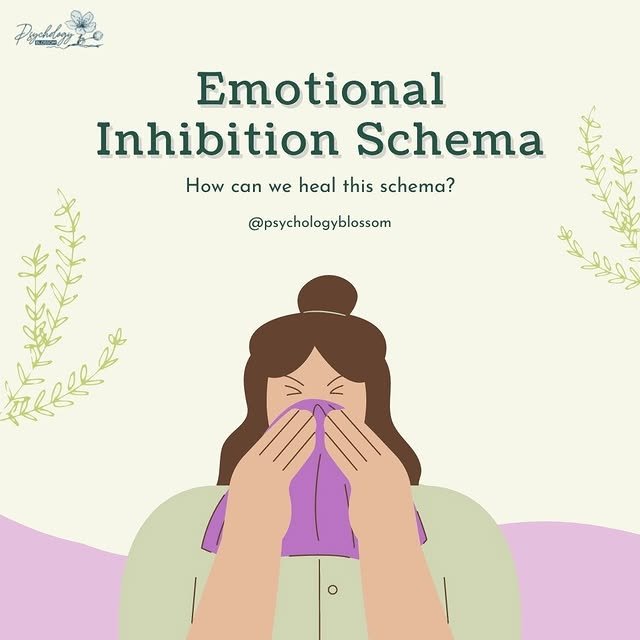Before diving into specific schemas, you might want to read our
introduction to Schema Therapy.
It provides a clear overview of the model and how schemas are understood and worked with in therapy.
Emotional Inhibition Schema: Understanding the Cost of Suppressing Feelings
Do you tend to be rational at all times?
Do you struggle to be spontaneous, silly, and in the moment?
Do you rarely express feelings?
If you have answered yes to any of the above, you may have developed an Emotional Inhibition Schema. As defined by clinician Jeffrey Young, the Emotional Inhibition Schema is the excessive inhibition of spontaneous action, feeling, or communication — usually to avoid disapproval by others, feelings of shame, or losing control of one’s impulses. While this schema may feel protective, over time it restricts emotional depth, relationships, and authentic self-expression.
Common Areas of Inhibition
- Inhibition of anger and aggression
- Inhibition of positive impulses (e.g., joy, affection, sexual excitement, play)
- Difficulty expressing vulnerability or communicating openly about feelings and needs
- Excessive emphasis on rationality while disregarding emotions
Those with this schema often struggle to express authentic feelings. It typically develops in childhood to avoid punishment or disapproval for emotions considered “unacceptable” within the family. Overly rigid or overprotective parenting can also discourage spontaneity, playfulness, and healthy emotional expression, leaving the child with an internalized message that feelings are unsafe.
Causes of the Emotional Inhibition Schema
If the Emotional Inhibition Schema is active in your life, you may have experienced early environments that discouraged emotions. For example:
- People around you rarely showed their emotions.
- Your parents may have discouraged emotional expression, prioritising control and discipline instead.
- Being confronted with sudden emotions may have left you feeling scared, anxious, or unsafe.
These experiences teach children that it is better to suppress emotions than to risk judgment or conflict. Over time, this suppression becomes automatic, even when it is no longer adaptive.
Living with the Emotional Inhibition Schema
In adulthood, certain signs often indicate the presence of this schema:
- Difficulty recognising or naming one’s own feelings
- Lack of insight into emotional states
- Superficial relationships, even with close family or partners
- Feelings of numbness, emptiness, or depression
- Appearing emotionally flat or blank to others
- Feeling indifferent about many aspects of life
Although people with this schema still have the full spectrum of emotions, they may be blocked from experiencing or showing them. Life can feel “safe” but also dull, limited, and lacking meaning. In relationships, this creates challenges. Partners may long for emotional connection but feel shut out. Over time, emotional inhibition can lead to isolation, dissatisfaction, and loneliness.
Coping Mechanisms
Individuals often cope with this schema in three common ways:
✽ Surrender
You may appear calm and composed, but beneath the surface you feel emotionally flat. By surrendering to the schema, you avoid emotional expression altogether, reinforcing feelings of emptiness and disconnection.
✽ Avoidance
Emotions feel threatening, so you avoid them. You may shy away from situations where you could be asked how you feel, or retreat from emotional intimacy altogether. Avoidance offers temporary safety but limits deeper connections and growth.
✽ Overcompensation
In some cases, people overcompensate by displaying exaggerated or inappropriate emotions, often under the influence of alcohol or in social settings. These emotional displays may feel unnatural or forced, further distancing the individual from genuine feelings.
The Impact of Emotional Inhibition
The cost of living with an Emotional Inhibition Schema is high. Emotional suppression often leads to:
- Strained relationships due to lack of vulnerability and openness
- Reduced satisfaction in life, as joy, spontaneity, and creativity are muted
- Greater risk of depression and anxiety
- Physical health consequences, such as stress-related illnesses
At work, people with this schema may be seen as reliable and rational, but they may struggle with leadership roles that require emotional intelligence. In friendships and romantic relationships, partners may feel unsupported or disconnected, leading to misunderstandings and conflict.
Schema Therapy
This schema can be overcome through Schema Therapy. In therapy, you are guided to reconnect with the emotions that were suppressed, learning to recognise and name them. By creating a safe environment, therapy encourages healthy emotional expression, allowing life to feel richer and relationships to deepen.
Through Schema Therapy, individuals often work on specific exercises to reduce inhibition, such as role play, journaling about emotions, or practicing vulnerability in safe relationships. The goal is not to abandon rational thinking but to balance it with emotional awareness and authenticity.
Over time, this process reduces inner emptiness, builds confidence in emotional expression, and allows for deeper intimacy with others. If you’re seeking Schema Therapy in Singapore or have any inquiries, please don’t hesitate to reach out to us. We are here to help.
We recommend This Video to those who want to learn more about the Emotional Inhibition Schema.

